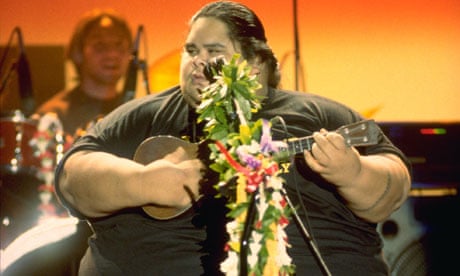For the past eight weeks, the biggest-selling song in Germany has been a cover version of Somewhere Over the Rainbow by a morbidly obese, ukulele-playing Hawaiian named Israel Kamakawiwo'ole. But any new fans hoping to see him perform will be as disappointed as the song's publisher, who heard the version a few years ago, realised the lyrics were slightly wrong, and asked Leah Bernstein at the Mountain Apple record label if she could ask him to re-record it. "Well I'd really love to," Bernstein replied, "but he's dead."
When Kamakawiwo'ole died in 1997, weighing more than 1,000lb, thousands of fans attended his funeral. The 38-year-old, known affectionately as Iz, was the giant of Hawaiian music, famed for the sweet strength of his voice and his celebration of native Hawaiian culture. But his career and health were in turmoil in 1988, when he spontaneously dropped into a recording studio in Honolulu at four in the morning and performed a plaintive acoustic medley of Somewhere Over the Rainbow with Louis Armstrong's What a Wonderful World.
The medley languished unheard until Iz's producers tagged it on to the end of his 1993 album Facing Future. The album was a huge hit in Hawaii and, later, the US mainland, but Somewhere Over the Rainbow (in both medley and edited form) has taken on a life of its own.
Since Iz's death, it has been licensed to scores of commercials, movies and TV shows, including ER and Life on Mars, driving sales to more than 2.5m units in the US alone and making it a popular choice at weddings and funerals. "Every time we believe it's waning, something occurs that brings it to the top of people's minds again," says Bernstein.
Its success in Germany (where it has sparked a boom in ukulele sales) is simply down to an enterprising record label falling in love with it and promoting it to radio. In the UK, it has been in the lower reaches of the Top 100 for nearly a year, and gets a full release later this month. For a multimillion-seller, it still feels like a word-of-mouth phenomenon, constantly wooing new fans with what Dan Kois, in his recent book about Facing Future, calls "its guileless reimagining of the standards, and its 4am willingness to go over the top in search of the sublime."

Comments (…)
Sign in or create your Guardian account to join the discussion